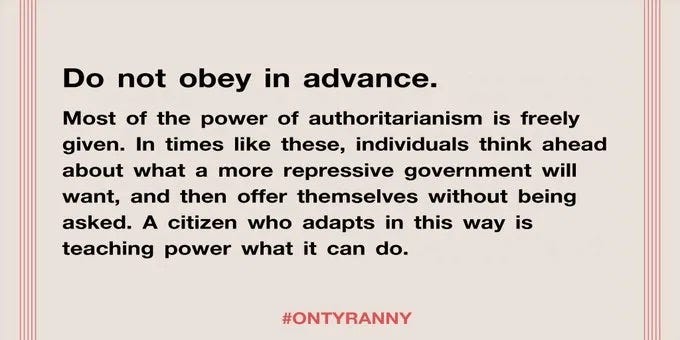Greetings, my fine feathered friends!
I have started a dozen different versions of this newsletter in my mind this week. I think, like a lot of us, I’m sifting explanations for the U.S. election, the outcome of which I thought likely, but I did hope otherwise.1
I listened to Sean Illing talk with Musa al-Gharbi on his new book We Have Never Been Woke, which I have on my bookshelf and need to read sooner rather than later. I think al-Gharbi’s description of “symbolic capitalists,” and the divide between “knowledge workers” and the “working class,” is probably one of the better filters for understanding contemporary America today.
I see a lot of people reach for patriarchy, racism, elitism, capitalism, all the other isms as an explanation, and I suspect that there’s some of all of that in the mix. But I think we need to look through a more simple, though no less important, lens.
Humans are not rational creatures, not really. We’re emotional ones.
And many of us are scared, confused, and uncertain. Nobody likes to live with ambiguity, and when you hear someone speak with confidence and see them point toward a horizon of seeming possibility, well… We all like to feel that we’ve made a good choice about how to solve our problems.
And it’s a lot easier to cede decision-making to someone who clearly has opinions about what to do and how “to fix it.”
A peculiar genius of the founding fathers of these united2 STATES was to leave much of the governing to the states. And since our electoral process really works at the state level, guess what? We have two years to organize, advocate, and fight like hell for our people.3 Because mid-terms.
But also, obey judiciously.4

Take the Long View
What follows may or may not be helpful to all readers, but I hope it’s helpful to those who keep company with Jesus.
In “The Weight of Glory” (what I think is the greatest essay in the English language), C.S. Lewis writes,
It is a serious thing to live in a society of possible gods and goddesses, to remember that the dullest and most uninteresting person you talk to may one day be a creature which, if you saw it now, you would be strongly tempted to worship, or else a horror and a corruption such as you now meet, if at all, only in a nightmare.
All day long we are, in some degree, helping each other to one or other of these destinations.
It is in the light of these overwhelming possibilities, it is with the awe and circumspection proper to them, that we should conduct all our dealings with one another, all friendships, all loves, all play, all politics.
There are no ordinary people.
You have never talked to a mere mortal.
Nations, cultures, arts, civilization—these are mortal, and their life is to ours as the life of a gnat.
But it is immortals whom we joke with, work with, marry, snub, and exploit—immortal horrors or everlasting splendors.
I’m convicted these days of my failure to treat others as possible gods and goddesses, humans made in the image of God and precious to him. Because this is where we start to build a world that lasts.
I had the pleasure this week of speaking to a group of women in the midst of their seminary journey. It was lovely to see these women—many of whom attended the event at the end of a long day in the midst of a long week—and I was struck by the sacrifices they make to exercise their intelligence, their gifts and skills, in a context and environment that so often ignores or belittles those same things.
I shared my own journey through seminary and American evangelicalism, and into finding meaning, purpose, and significance,5 which now, more than ever, feels truly for such a time as this.
When I read the gospels and epistles of the Christian scriptures, I’m struck by how often we are encouraged to hold steady in our journey, especially because it’s unlikely that we’ll see the fruition of any of our efforts in our own lifetimes.
Because the Spirit plays the long game. And we are citizens of another kingdom.
We long for, and work toward, justice, equality, freedom for and with each other. Someday I truly think we will see that reality with our own eyes and experience it with our own being. But I think that those things are all happy consequences, signs that the long arc of human history has finally bent to Christ’s return and the kingdom that has no end.
I’ve been listening to this version of this song for…oh gosh, almost twenty years now? Bob Dylan originally wrote “When He Returns” during his gospel era for Slow Train Comin’, but I love Kevin Max’s voice here.
Surrender your crown on this bloodstained ground, take off your mask
He sees your deeds, He knows your needs even before you ask
How long can you falsify and deny what is real?
How long can you hate yourself for the weakness you conceal?
Of every earthly plan that be known to man, He is unconcerned
He’s got plans of His own to set up His throne
When He returns- Bob Dylan (1979)
But “nothing—no human being or institution, no time, no space, no spiritual being, no event—stands between God and those who trust him.”6
Have peace! Take heart! The king is coming.7
Let’s be hopeful, creative, and wise—together.
Shalom,
What else?
Looking for more resources to help with your personal formation journey? Get your free guide!
My practice-based workshops help you practice commitment care or map your role models so you can become the person you were created to be. Great for small teams and student groups!
Are you a non-fiction writer seeking help with a project? I offer structural editing on your manuscript’s structure, theme or purpose, point of view, perspective, and tone.
You can learn more about this newsletter and my work on the About page.
Have a question? Ask me anything.
One more thing…
Want to help me continue sharing free stuff? Buy me a book!
Or should I say “connected” if not “united”?
I’m previewing one of my upcoming guests for season 1 of People Watching. My guest’s advice is to “find your people, and fight like hell for them.” Which is kick-ass advice, if you ask me.
But seriously…don’t tell people how to yank your chain.
Dallas Willard, The Scandal of the Kingdom, p. 9






